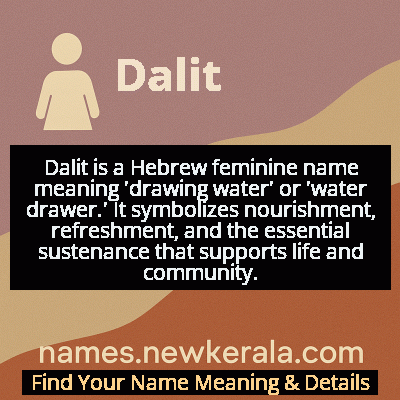Dalit Name Meaning & Details
Origin, Popularity, Numerology Analysis & Name Meaning of Dalit
Discover the origin, meaning, and cultural significance of the name DALIT. Delve into its historical roots and explore the lasting impact it has had on communities and traditions.
Name
Dalit
Gender
Female
Origin
Hebrew
Lucky Number
1
Meaning of the Name - Dalit
Dalit is a Hebrew feminine name meaning 'drawing water' or 'water drawer.' It symbolizes nourishment, refreshment, and the essential sustenance that supports life and community.
Dalit - Complete Numerology Analysis
Your Numerology Number
Based on Pythagorean Numerology System
Ruling Planet
Sun
Positive Nature
Leaders, ambitious, highly driven, self-reliant, innovative.
Negative Traits
Overly aggressive, domineering, impatient, selfish.
Lucky Colours
Red, orange, gold.
Lucky Days
Sunday.
Lucky Stones
Ruby, garnet.
Harmony Numbers
2, 3, 9.
Best Suited Professions
Entrepreneurs, managers, engineers.
What People Like About You
Courage, determination, leadership.
Famous People Named Dalit
Dalit Kahana
Singer and actress
Prominent figure in Israeli children's entertainment
Dalit Atrakchi
Diplomat
Israeli ambassador and cultural representative
Dalit Halevy
Journalist
Covered significant political and social issues in Israel
Name Variations & International Equivalents
Click on blue names to explore their detailed meanings. Gray names with will be available soon.
Cultural & Historical Significance
The cultural resonance of Dalit extends beyond its literal meaning to encompass broader themes of community service and emotional sustenance. In traditional Jewish communities, women were often the keepers of domestic and communal water sources, making this name a tribute to their crucial role in maintaining family and social structures. The name also connects to biblical and historical narratives where water plays transformative roles—from Miriam's well that followed the Israelites in the desert to the ritual mikveh waters that symbolize spiritual rebirth. This rich cultural tapestry makes Dalit more than just a name; it represents a connection to ancestral practices, the sustaining power of community, and the eternal cycle of giving and receiving that characterizes healthy societies.
Extended Personality Analysis
Women named Dalit typically exhibit personality traits centered around nurturing, practicality, and emotional depth. The name's association with drawing water suggests someone who naturally provides sustenance and support to others, acting as an emotional anchor in their relationships. They tend to be grounded individuals with a strong sense of responsibility toward their community and loved ones. Dalits often possess a quiet strength that enables them to handle challenges with grace and resilience, much like water that adapts to its container while maintaining its essential nature. Their practical wisdom and ability to address fundamental needs make them reliable problem-solvers in both personal and professional contexts.
Beyond their nurturing qualities, Dalits often demonstrate remarkable intuition and emotional intelligence. They have an innate understanding of human needs and can sense when others require support or refreshment. This emotional perceptiveness combines with a generous spirit, making them excellent listeners and compassionate friends. Their personality reflects the dual nature of water—both gentle and powerful, adaptable yet persistent. While they may appear calm on the surface, they often possess deep emotional currents and strong convictions. This balance of strength and sensitivity allows them to navigate complex social situations with wisdom and to provide the emotional nourishment that helps relationships and communities flourish.
Modern Usage & Popularity
In contemporary usage, Dalit remains primarily concentrated within Israeli and Jewish communities, though it has gained some international recognition through cultural exchange. The name maintains steady but moderate popularity in Israel, often chosen by parents who value traditional Hebrew names with meaningful, positive connotations. While not among the top-ranking names in recent Israeli birth statistics, it continues to be selected for its beautiful symbolism and connection to cultural heritage. The name has experienced some decline as more modern or internationally popular names gain traction, but it retains appeal for those seeking names with deep roots and life-affirming meanings. Outside Israel, Dalit appears occasionally in Jewish diaspora communities, particularly among families maintaining strong connections to Hebrew language and tradition. Its usage remains relatively rare in non-Jewish contexts, though the growing interest in meaningful, cross-cultural names may increase its visibility internationally.
Symbolic & Spiritual Meanings
Symbolically, Dalit represents the fundamental concepts of sustenance, emotional nourishment, and spiritual refreshment. Like water drawn from a deep well, the name symbolizes accessing inner resources and providing what is essential for growth and survival. It embodies the cyclical nature of giving and receiving—the idea that we must draw from sources of strength to nourish others, while also being replenished through community and self-care. The name carries metaphors of purity, clarity, and life's essential elements, suggesting someone who brings clarity to complex situations and purity of intention to relationships. It also represents emotional depth and intuition, reflecting water's ability to flow around obstacles while maintaining its essential character. The symbolism extends to themes of community service, as drawing water historically was not just an individual act but one that sustained entire families and villages, making Dalit a name that speaks to interconnectedness and mutual support.

